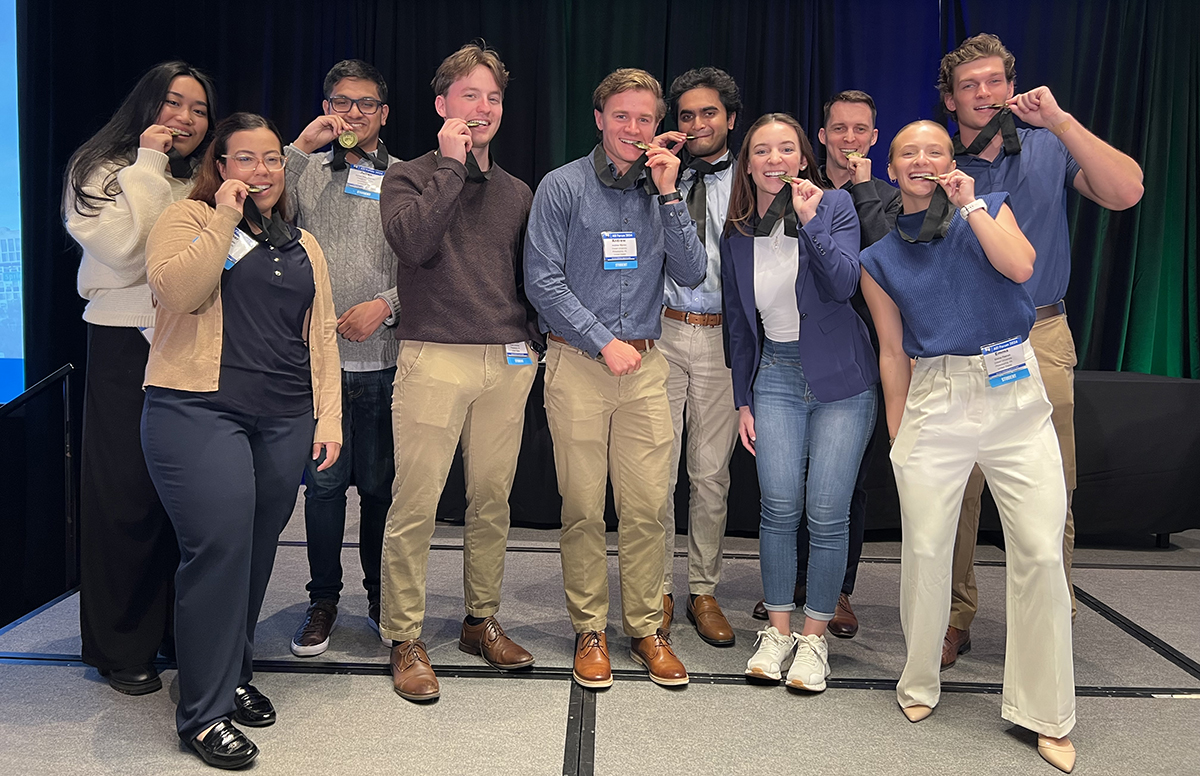
A team of ten Drexel Engineering seniors from the College of Engineering has
won first place in the integration category at the Architectural Engineering
Institute's 2024 International Student Design Competition. The
multidisciplinary team, consisting of students majoring in
civil,
architectural, and environmental engineering, showcased their
design to judges on April 9 in San Jose, California.
The competition, which encouraged collaboration and peer review, challenged
students to develop innovative solutions to complex design problems while
considering the integration of engineered systems with the building's
architecture. Participants had to demonstrate their knowledge and skills in
various aspects of building design and construction, including structural
engineering, mechanical and electrical design, and construction management.
For this year's competition, teams were asked to redesign a Veterans Affairs
ambulatory care center in Omaha, Nebraska. The Drexel team worked to ensure
that their concept caters to the needs of veterans, their families, and the
staff who support them.
"We looked at the stakeholders of the project and divided our design
approach into three categories: patients, staff, and family members," said
team leader Alex Beglan. "We wanted to create spaces that address the needs
of each group while preserving the functionality of the clinical spaces."
The design includes several innovative features, such as a vegetation garden
on the south side of the building for use by patients, family members and
staff; a double skin facade on the north side of the building for
insulation; and a redesigned assembly space that enhances stakeholders'
interaction with the outdoors. The team also had to tackle challenges on how
to implement modular construction and preserve a circular economy approach
for building disassembly.

The team's design concept includes a double skin facade for insulation.
To tackle the project, the team was divided into two subgroups: one focusing
on the mechanical, electrical, and plumbing systems, and the other on the
structural aspects, including geotechnical foundation and modular
construction, said team member Kris Melag. The team also held regular
group-wide meetings to ensure the integration of all the systems and
maintain a cohesive design approach.
One of the unique challenges the team faced was the competition's timeline,
which required them to work ahead of their regular senior design schedule.
"Drexel's schedule made doing this competition a little challenging," said
team member Emma Pasnak. "We know that most students who go to semester
schools would be starting their work in August, so we met over the summer
term and started our research and design before the fall semester even
started."
Despite the demanding schedule, the team rose to the challenge, putting in
long hours and collaborating effectively to bring their vision to life.
Their hard work and dedication paid off when they were awarded first place
in the integration category, which recognizes the team that most
successfully coordinated and collaborated across all systems design and
challenges.
Reflecting on the team's experience, Beglan shared, "Everyone is beyond
proud to have won an award. But something I've noticed in conversations with
the team since the presentation and awards is how much everyone learned that
they didn't expect to."
He added, "I've heard the team speak to the ownership they felt over the
piece of the project they had a hand in. I think that's the crux of
opportunities like this. There are only so many moments in education or
practice that a designer gets to have the freedom to try things and push
boundaries. This project gave that to the team in a way that seems
profound."
The other members of the team, who were instrumental in the project's
success, are Ambar Acosta, Laura Bach, Shane Corson, Anh Dang, Julian
Ramcharitar, Igor Solovev and Andrew Warren. Together, they have
demonstrated the power of collaboration and innovation, setting a new
standard for future Drexel Engineering teams in the years to come.